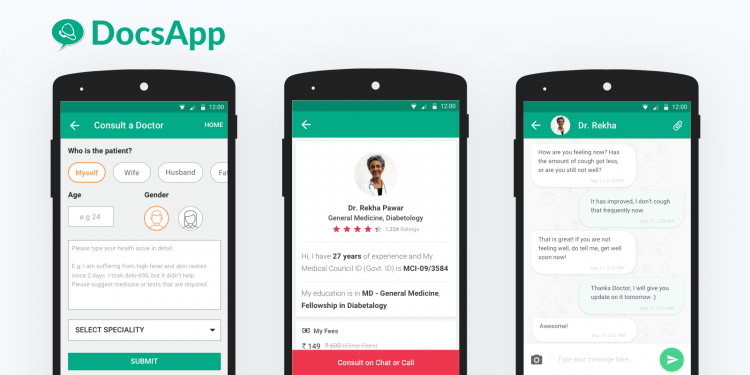Kylee McIntyre at TechInAsia: “A problem beyond India’s low doctor-to-patient ratio is the distribution of those doctors. Most, particularly specialists, congregate in bigger cities and get seen by patients in the surrounding areas. Only 19 percent of specialists are available in community health centers across India, and most fall well below the country’s requirement for specialists. Community health centers are located in smaller towns and help patients in the area decide if they need to visit a larger, better-equipped city facility….
The IIT-Madras grad’s company, DocsApp, co-founded with fellow IIT-Madras alum Enbasekar D (CTO), joins startups like Practo, DocDoc, and Medinfi in helping patients find physicians. However, the app’s main focus is specialists, and it lets patients chat with doctors and get consultations.

DocsApp’s name is directly inspired by WhatsApp. As long as you have a chat screen on your phone, you can input your problems and location, find a doctor, and ask questions. A user can pay for his or her own appointment over mobile. If treatment requires a physical visit, the user’s money is refunded….
Doctor profiles include the physician’s experience, medical counsel ID, patient reviews, specialty, and languages – DocsApp covers 17 different languages. DocsApp has 1,200 doctors in 15 specialties. All doctors on the platform are verified by looking up certification, an interview, and a facilities review.
If a consultation reveals that a patient needs a prescription, the doctor can provide a digitally-signed e-prescription. DocsApp can deliver medicines within two days to any location in India, says Satish.
Once a user has access to one of the doctors, he or she can message the doctor 24/7 and get a response in 30 minutes – Satish says that the company’s average is now 18 minutes. The team of 55 is aiming for a minute or less….
Telemedicine is one of the ways tech is combatting India’s doctor shortage. Other startups in the industry in the country include Visit, which focuses on both physical and mental health, and SeeDoc, a physician video consultation app.
A chat is a little less personal than a physical visit, which can open the door for patients who want to discuss more taboo topics in India, like mental health and fertility questions. Satish adds that women who live in locations where it’s best to be accompanied by a man when going out also find convenience, as they don’t necessarily need to wait for a husband to come back from work before addressing a medical question she has about her child…(More)”.